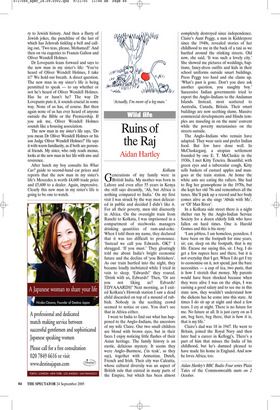Ruins of the Raj
Aidan Hartley
Kolkata
Generations of my family were in British India. My mother was born in Lahore and even after 55 years in Kenya she still says dreamily, ‘Ah, but Africa is nothing compared to India.’ On my first visit I was struck by the way men defecated in public and decided I didn’t like it. For all their poverty, men shit discreetly in Africa. On the overnight train from Ranchi to Kolkata, I was imprisoned in a compartment of steelworks managers drinking quantities of rum-and-coke. When I told them my name, they declared that it was too difficult to pronounce. ‘Instead we call you Edwards. OK?’ I shrugged. ‘If you must.’ They gloatingly told me about India’s bright economic future and the decline of ‘you Britishers’. As our train hurtled into the night, they became loudly inebriated while I tried in vain to sleep. ‘Edwards!’ they roared. ‘Drink with us, Edwards!’ Then, ‘Or are you not liking us? Edvards! EDVAAARDS!’ Next morning, as I exited Kolkata’s Howrah station I saw a dead child discarded on top of a mound of rubbish. Nobody in the seething crowd seemed to notice or care. You don’t see that in Africa either.
I went to India to find out what has happened to the Anglo–Indians, the ancestors of my wife Claire. Our two small children are blond with brown eyes, but in their faces I enjoy noticing little flashes of their Asian heritage. The family history is an exotic, delicious mystery. It seems they were Anglo–Burmese, (‘in teak’, as they say), together with Armenian, Dutch, French and Irish. Their city was Calcutta, whose cultural diversity was an aspect of British rule that existed in many parts of the Empire, but which has been almost completely destroyed since independence. Claire’s Aunt Peggy, a nun in Kidderpore since the 1940s, revealed stories of her childhood to me in the back of a taxi as we hurtled around the stinking streets. Old now, she said, ‘It was such a lovely city.’ She showed me pictures of weddings, baptisms, fancy-dress outfits and kids in their school uniforms outside smart buildings. Press Peggy too hard and she clams up. ‘What’s past is gone. Don’t you dare ask another question, you naughty boy.’ Successive Indian governments tried to export the Anglo–Indians to the Andaman Islands. Instead, most scattered to Australia, Canada, Britain. Their smart buildings are now seething slums. Massive commercial developments and Hindu temples are muscling in on the nuns’ convent while the poverty metastasises on the streets outside.
The Anglo–Indians who remain have adapted. They wear saris and prefer Indian food. But few have done well. In McCluskieganj, a utopian settlement founded by one E. T. McCluskie in the 1930s, I met Kitty Texeira. Beautiful, with green eyes and a tubercular cough, Kitty sells baskets of custard apples and mangoes at the train station. At home the white ants are eating the rafters. She had to flog her gramophone in the 1970s, but she kept her old 78s and remembers all the tunes. She’ll pick up a record and her body comes alive as she sings ‘Abide with Me’, or ‘Ol’ Man River’.
In a Kolkata side street there is a night shelter run by the Anglo-Indian Service Society for a dozen elderly folk who have fallen on hard times. One is Harold Gomes and this is his story: ‘I am jobless. I am homeless, penniless. I have been on the footpath for nine years, sir; eat, sleep on the footpath, that is my life. Excuse me saying this, sir. I beg. I do get a few rupees here and there, but it is not everyday that I get. When I do get I try to economise on it, not spend, just the bare necessities — a cup of tea, two puris, that is how I stretch that money. My parents would have been shocked because when they were alive I was on the ships, I was earning a good salary and to see me in this state now, they wouldn’t understand how the dickens has he come into this state. At times I do sit up at night and shed a few tears. I cry at night. There is no future for me. No future at all. It is just carry on as I am, beg here, beg there, that is how it is, that is my life.’ Claire’s dad was 18 in 1947. He went to Britain, joined the Royal Navy and then later had a career in Kellogg’s. There’s a part of him that misses the India of his childhood, but he’s damned pleased to have made his home in England. And now he loves Africa, too.
































































 Previous page
Previous page